unit10
八年级英语下Unit10翻译

Linda: Thanks so much!
• P75, 3a • 1.我的孩子们成长得很快。 • 2.我女儿16岁了,我儿子已经上初中了。 • 3.由于他们长大了,我们的房子似乎变小了。 • 4. 所以我们想在庭院出售一些我们的东西并把
(所得的)钱捐给儿童福利院。 • 5.我们已经从我们的卧室清理出许多东西。 • 6.我们决定每个人卖出五件我们不再使用的东西。 • 7.起初,我的儿子很难过。 • 8.虽然他不玩这些旧玩具很长时间了,但是还是
想把它们保存下来。
•
• 9.例如,他自从四岁生日起就有了一套火车和轨 道玩具,他几乎每周都玩,一直玩到大约七岁。
• 10.他也不想失去他的玩具猴。 • 11.当他还小的时候他每天晚上睡在这只玩具猴
旁边。
• 12.虽然我女儿让出某些玩具也感到伤心,但她 更通情达理。
• 13.至于我,我不想放弃我的球衣。 • 14. 但是说实话,现在我有一段时间没有踢球了。 • 15.我也老了!
13.但现在房屋确实很破旧了。
14.我听说那里要建一所新学校。”
15.仲伟认为这样的发展很好, 而且他也知道他 的家乡不能总是保持老样子。
• 3.琳达:太好了!这里的很多孩子都喜欢阅读。
Linda: Great! Many children here love reading.
•
• 4.艾米:看看给小孩子们的这些毛绒玩具和棋盘游戏。 自从我还是小孩子的时候我就拥有它们了。 还有一件 毛衣和一条连衣裙。
• Amy: And check out these soft toys and board games for younger kids. I’ve had them since I was a child. There’s also a sweater and a dress.
Unit10 知识要点解析
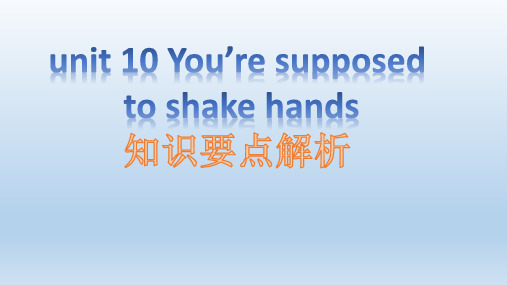
• be worth doing sth 值得做某事,句子主语一般事或物,是do的宾语 • be worth +钱 “值多少钱” • be worth +名词 “值得” • well worth ‘很值得’,不能说 very worth • 【练一练】
_________(握手)with them. • ②当第一次见朋友是,你们应该握手。 • You’re ________ to shake ______ (hand) when you meet your
friends.
3.In the United States, they’re expected to shake hands. 在美国,他们应该握手。
11.If there are people in the meeting room , you are supposed to knock before entering .
• knock v. 敲(门等), 碰撞 • knock at/on the door 敲门 knock into 与......相撞 knock down 撞倒 • 【练一练】用介词at/on,into,down填空 • 1)He knocked ______ the door , but no one answered. • 2)The car knocked ________ the tree last night and the driver hurt. • 3)The boy was knocked ________ by a running bike on the street.
tired.
人教版九年级全一册英语Unit10重点语法知识点总结
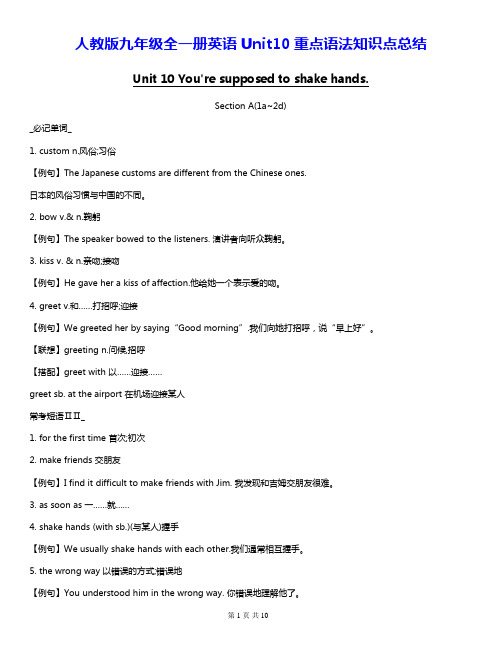
人教版九年级全一册英语Unit10重点语法知识点总结Unit 10 You're supposed to shake hands.Section A(1a~2d)_必记单词_1. custom n.风俗;习俗【例句】The Japanese customs are different from the Chinese ones.日本的风俗习惯与中国的不同。
2. bow v.& n.鞠躬【例句】The speaker bowed to the listeners. 演讲者向听众鞠躬。
3. kiss v. & n.亲吻;接吻【例句】He gave her a kiss of affection.他给她一个表示爱的吻。
4. greet v.和……打招呼;迎接【例句】We greeted her by saying“Good morning”.我们向她打招呼,说“早上好”。
【联想】greeting n.问候,招呼【搭配】greet with 以……迎接……greet sb. at the airport 在机场迎接某人常考短语ⅡⅡ_1. for the first time 首次;初次2. make friends 交朋友【例句】I find it difficult to make friends with Jim. 我发现和吉姆交朋友很难。
3. as soon as 一……就……4. shake hands (with sb.)(与某人)握手【例句】We usually shake hands with each other.我们通常相互握手。
5. the wrong way 以错误的方式;错误地【例句】You understood him in the wrong way. 你错误地理解他了。
6. hold out 伸出(手等)7. greet each other 互相问候8. to one’s surprise 令某人惊讶的是经典句型ⅢⅡ1. That's how people in Japan are expected to greet each other.那就是在日本人们互相问候的方式。
unit10单词表
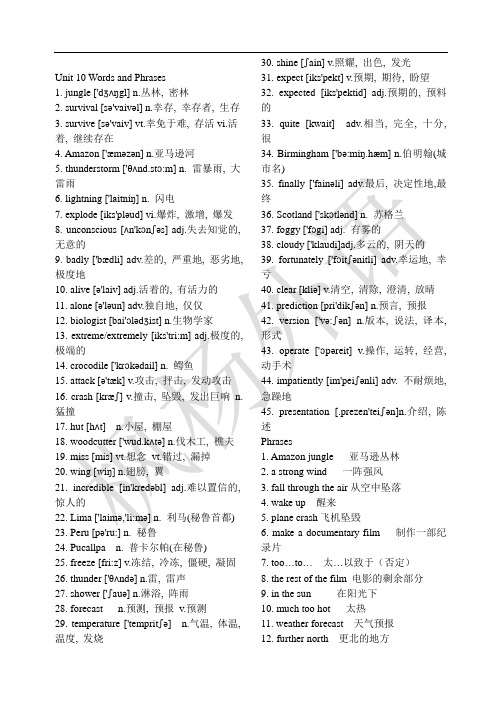
Unit 10 Words and Phrases1. jungle ['dʒʌŋgl] n.丛林, 密林2. survival [sə'vaivəl] n.幸存, 幸存者, 生存3. survive [sə'vaiv] vt.幸免于难, 存活vi.活着, 继续存在4. Amazon ['æməzən] n.亚马逊河5. thunderstorm ['θʌnd.stɔ:m] n. 雷暴雨, 大雷雨6. lightning ['laitniŋ] n. 闪电7. explode [iks'pləud] vi.爆炸, 激增, 爆发8. unconscious [ʌn'kɔnʃəs] adj.失去知觉的, 无意的9. badly ['bædli] adv.差的, 严重地, 恶劣地, 极度地10. alive [ə'laiv] adj.活着的, 有活力的11. alone [ə'ləun] adv.独自地, 仅仅12. biologist [bai'ɔlədʒist] n.生物学家13. extreme/extremely [iks'tri:m] adj.极度的, 极端的14. crocodile ['krɔkədail] n. 鳄鱼15. attack [ə'tæk] v.攻击, 抨击, 发动攻击16. crash [kræʃ] v.撞击, 坠毁, 发出巨响n.猛撞17. hut [hʌt] n.小屋, 棚屋18. woodcutter ['wud.kʌtə] n.伐木工, 樵夫19. miss [mis] vt.想念vt.错过, 漏掉20. wing [wiŋ] n.翅膀, 翼21. incredible [in'kredəbl] adj.难以置信的, 惊人的22. Lima ['laimə,'li:mə] n. 利马(秘鲁首都)23. Peru [pə'ru:] n. 秘鲁24. Pucallpa n. 普卡尔帕(在秘鲁)25. freeze [fri:z] v.冻结, 冷冻, 僵硬, 凝固26. thunder ['θʌndə] n.雷, 雷声27. shower ['ʃauə] n.淋浴, 阵雨28. forecast n.预测, 预报v.预测29. temperature ['tempritʃə] n.气温, 体温, 温度, 发烧30. shine [ʃain] v.照耀, 出色, 发光31. expect [iks'pekt] v.预期, 期待, 盼望32. expected [iks'pektid] adj.预期的, 预料的33. quite [kwait] adv.相当, 完全, 十分, 很34. Birmingham ['bə:miŋ.hæm] n.伯明翰(城市名)35. finally ['fainəli] adv.最后, 决定性地,最终36. Scotland ['skɔtlənd] n. 苏格兰37. foggy ['fɔgi] adj. 有雾的38. cloudy ['klaudi]adj.多云的, 阴天的39. fortunately ['fɔitʃənitli] adv.幸运地, 幸亏40. clear [kliə] v.清空, 清除, 澄清, 放晴41. prediction [pri'dikʃən] n.预言, 预报42. version ['və:ʃən] n.版本, 说法, 译本, 形式43. operate ['ɔpəreit] v.操作, 运转, 经营, 动手术44. impatiently [im'peiʃənli] adv. 不耐烦地, 急躁地45. presentation [.prezen'teiʃən]n.介绍, 陈述Phrases1. Amazon jungle 亚马逊丛林2. a strong wind 一阵强风3. fall through the air从空中坠落4. wake up 醒来5. plane crash飞机坠毁6. make a documentary film 制作一部纪录片7. too…to…太…以致于(否定)8. the rest of the film 电影的剩余部分9. in the sun 在阳光下10. much too hot 太热11. weather forecast 天气预报12. further north 更北的地方13. no more 不再14. later on 之后,后来15. the Austrian skiing team 奥地利滑雪队16. skiing school 滑雪学校17. win an Olympic Gold medal 赢得一枚奥运会金牌78-80页Pain [pein] n. 疼痛;努力in pain 痛苦vt. 使…痛苦;使…烦恼vi. 感到疼痛;引起疼痛stomach ['stʌmək] n. 胃;腹部;胃口hurt [hə:t] vt. 使受伤;损害;使疼痛;使痛心get hurt 受伤vi. 感到疼痛;有坏处;带来痛苦hurt badly 头痛的厉害,严重受伤[ 过去式hurt 过去分词hurt 现在分词hurting ]press [pres] vt. 压;按;逼迫;紧抱vi. 压;逼;重压n. 压;按;新闻;出版社;[印刷] 印刷机whatever [hwɔt'evə, 'hwət-] adj. 不管什么样的pron. 无论什么;诸如此类conj. 无论什么weird [wiəd] adj. 怪异的;不可思议的;超自然的gone [ɡɔn] adj. 离去的;死去的;用光的v. 去(go的过去分词)wimp [wimp] n. 懦弱的人;无能的人aspirin ['æspərin] n. 阿司匹林(解热镇痛药)compulsory [kəm'pʌlsəri] adj. 义务的;必修的;被强制的n. (花样滑冰、竞技体操等的)规定动作[ 复数compulsories ]scheme [ski:m] n. 计划;组合;体制;诡计vi. 搞阴谋;拟订计划vt. 计划;策划[ 过去式schemed 过去分词schemed 现在分词scheming]marta viera da silva 玛尔塔维埃拉达席尔瓦Swedishadj. 瑞典的;瑞典语的;瑞典人的n. 瑞典语;瑞典人词组1、have got a pain in感到疼痛2、right here就是这里3、keep on doing继续做某事It's easy to keep on doing things the same way as before.像以前那样不变地做一件事很容易。
人教版九年级英语课件:Unit10(共35张PPT)
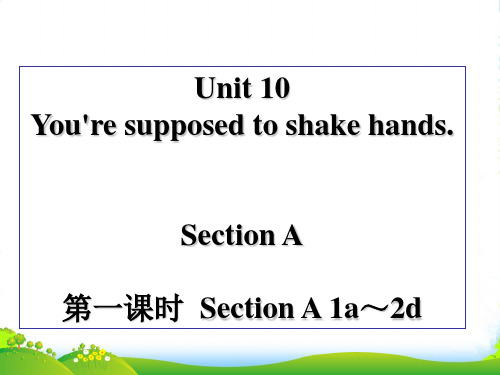
课堂同步
一、阅读课本第74页2d,回答问题。 1.What is the funny thing happened at the party? J_o_h_n_m__et__a _J_a_p_an_e_s_e__b_o_y,_a_n_d_a_s_s_o_o_n__a_s _h_e_h_e_l_d_o_u_t_ h_i_s_h_a_n_d_,t_h_e_b_o_y__b_o_w_e_d_._______________________ 2.How are Japanese people expected to greet each
A. invented B. discovered
C. found
D. found out
课堂同步
阅读课本第75页3a,判断正误。正确的写“T”,错 误的写“F”。
(T )1.It is important for people in Colombia to spend time with family and friends.
friends in our everyday lives. 我们特别珍惜平日生活中和家人、朋友在一起的时光。 spend time with sb. 与某人共度时光 如:He will not come. He spends all his free time with his
family. 他不会来。他所有的空闲时间都和他的家人在一起。
知识拓展
(1)若表示“在……上花费(时间、金钱等)”,常用句 型spend some money / some time on sth.,介词on后面 接名词或代词。 如:Kitty spends two hours on her homework every day. 凯蒂每天花两个小时做家庭作业。
人教版九年级英语unit10知识点
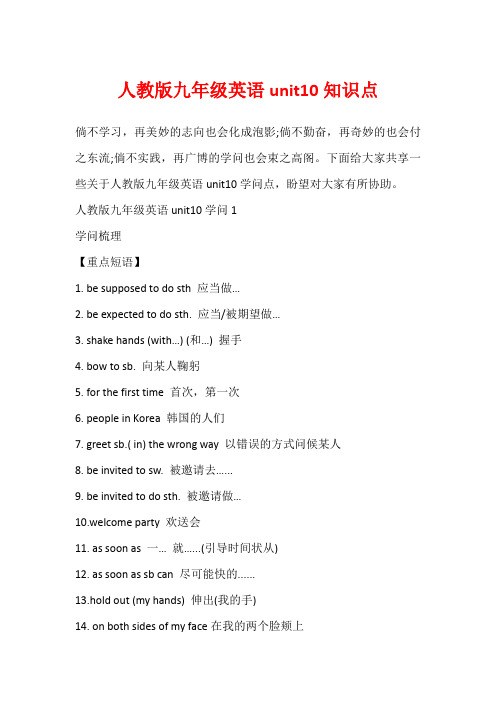
人教版九年级英语unit10知识点倘不学习,再美妙的志向也会化成泡影;倘不勤奋,再奇妙的也会付之东流;倘不实践,再广博的学问也会束之高阁。
下面给大家共享一些关于人教版九年级英语unit10学问点,盼望对大家有所协助。
人教版九年级英语unit10学问1学问梳理【重点短语】1. be supposed to do sth 应当做…2. be expected to do sth. 应当/被期望做…3. shake hands (with…) (和…) 握手4. bow to sb. 向某人鞠躬5. for the first time 首次,第一次6. people in Korea 韩国的人们7. greet sb.( in) the wrong way 以错误的方式问候某人8. be invited to sw. 被邀请去…...9. be invited to do sth. 被邀请做…10.welcome party 欢送会11. as soon as 一… 就…...(引导时间状从)12. as soon as sb can 尽可能快的......13.hold out (my hands) 伸出(我的手)14. on both sides of my face在我的两个脸颊上15. be from= come from 来自16. be relaxed about 对…放松/随意17. a bit/ little late 晚一点18. value the time we spend with sb珍惜我们与某人度过的时间19.in our everyday lives 在我们的日常生活中20. drop by 顺便探望,随意进入21. make plans ( to do sth.) 打算做某事22. plan to do sth.打算做某事23. on the side of the face在脸的一侧24. the town center 在城镇中心25. as many as sb can = as many as possible 尽可能多的…26. be on time 守时27. the capital of clocks and watches钟表之都28. after all 终归,终归29. at noon 在中午30. 15 minutes late 迟到15分钟【重点句型】1. He should have told me about it.他本应当把这件事告知我。
人教版英语七年级下Unit10单词、知识梳理、词汇句式精讲

人教版英语七年级下Unit10单词、知识梳理、词汇句式精讲Unit10 单词(音标)noodle ['nuːdl] n. 面条mutton ['mʌtn] n. 羊肉beef [biːf] n. 牛肉cabbage ['kæbɪdʒ] n. 卷心菜;洋白菜potato [pə'teɪtəʊ] n.土豆;马铃薯special ['speʃəl] n.特色菜;特价品adj. 特别的;特殊的would [wʊd] modal v.(表示意愿)愿意would like愿意;喜欢yet [jet] adv. (常用于否定句和疑问句)还;仍然large [lɑː(r)dʒ] adj.大号的,大的order ['ɔː(r)də(r)] n.&v. 点菜;命令takeone’s order 点菜size [saɪz] n. 大小;尺码bowl [bəʊl] n. 碗one(large) bowl of…一(大)碗tofe [təʊfu:] n. 豆腐meat [miːt] n. (可食用的)肉dumpling ['dʌmplɪŋ] n.饺子porridge ['pɒrɪdʒ] n. 粥;面糊onion ['ʌnjən] n. 洋葱fish [fɪʃ] n. 鱼;鱼肉pancake ['pænkeɪk] 烙饼;薄饼world [wɜː(r)ld] n. 世界aroundthe world世界各地answer ['ɑːnsə] v. 回答n. 答案different ['dɪfərənt] adj.不同的cake [keɪk] n. 蛋糕candle ['kændl] n. 蜡烛age [eɪdʒ] n. 年龄makea wish许愿blow [bləʊ] v. 吹blowout吹灭if [ɪf] conj. 如果will [wɪl] v. 将要;会the UK(=theUnited Kingdom) [,ju:’keɪ]([jʊ'naɪtɪd ‘kɪŋdəm]) n.英国candy ['kændi] n. 糖果lucky ['lʌki] adj. 幸运的popular ['pɒpjʊlə] adj.受欢迎的;普遍的getpopular受欢迎;流行cutup切碎idea [aɪ'dɪə] n.想法;主意bring good luck to…给……带来好运Unit10 知识梳理【重点短语】1. would like sth. 想要某物2. would like to do sth. 想要做某事3. put on 穿上,戴上4. take one’s order 点菜5. in the beef noodles 在牛肉面里6. mapo tofu with rice麻婆豆腐外带大米7. what kind of noodles什么种类的面条8. a large bowl of noodles一大碗面条9. a medium bowl of noodles 一中碗面10. a small bowl of noodles 一小碗面条11. what size 什么尺寸12.May I take your order? 可以点餐了么?13. beef noodles with carrots带有胡萝卜的牛肉面14. green tea 绿茶15. orange juice 橙汁16. around the world 世界各地17. in different countries 在不同的国家18. birthday cakes with candles带蜡烛的生日蛋糕19. the birthday person 寿星20.make a wish 许愿21. blow out the candles 吹灭蜡烛22. in one go 一口气,一次性的23. come true 实现24. get popular 变得流行,受欢迎25. long noodles 长寿面26. cut up 切碎/断27. a symbol of long life 长寿的象征28. be different 不同的29. be the same 一样的30. bring good luck to sb. 带给某人幸运31. have different kinds of …有不同种类的......【重点句型】1. What would you like?您需要什么?2. I'm not sure yet. Are there any vegetables in the beef noodles? 我不确定,牛肉面里有蔬菜吗?3. Yes, there are some tomatoes.有,里面有西红柿。
人教九年级英语unit10单词讲解
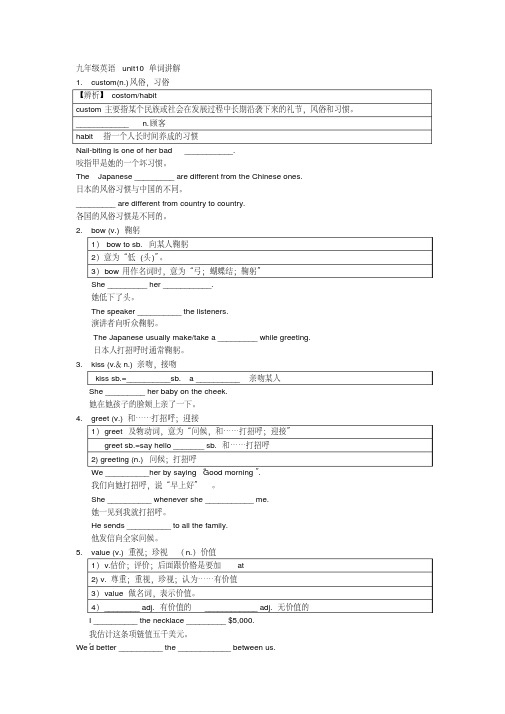
九年级英语unit10单词讲解1.custom(n.)风俗,习俗【辨析】costom/habitcustom主要指某个民族或社会在发展过程中长期沿袭下来的礼节,风俗和习惯。
____________ n.顾客habit 指一个人长时间养成的习惯Nail-biting is one of her bad ___________.咬指甲是她的一个坏习惯。
The Japanese _________ are different from the Chinese ones.日本的风俗习惯与中国的不同。
_________ are different from country to country.各国的风俗习惯是不同的。
2.bow (v.) 鞠躬1)bow to sb. 向某人鞠躬2)意为“低(头)”。
3)bow用作名词时,意为“弓;蝴蝶结;鞠躬”She _________ her ___________.她低下了头。
The speaker __________ the listeners.演讲者向听众鞠躬。
The Japanese usually make/take a _________ while greeting.日本人打招呼时通常鞠躬。
3.kiss (v.&n.) 亲吻,接吻kiss sb.=__________sb. a __________ 亲吻某人She _________ her baby on the cheek.她在她孩子的脸颊上亲了一下。
4.greet (v.) 和……打招呼;迎接1)greet 及物动词,意为“问候,和……打招呼;迎接”greet sb.=say hello _______ sb. 和……打招呼2) greeting (n.) 问候;打招呼We __________her by saying “Good morning”.我们向她打招呼,说“早上好”。
She __________ whenever she ___________ me.她一见到我就打招呼。
人教版九年级英语Unit10单元知识点课件
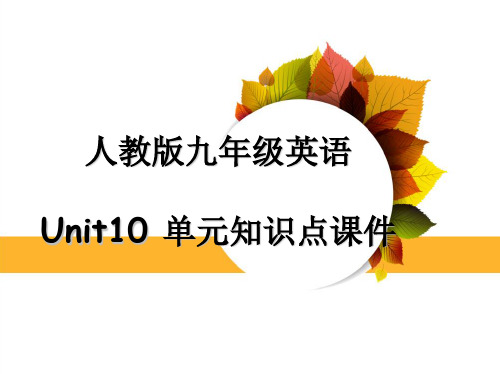
解析 本题考查be worth doing的结构。
答案 visiting
Unit 10
You're supposed to shake hands.
栏目索引
Section B
知识点八 empty的用法 教材原文 In China,it‘s impolite to use your chopsticks to hit an empty bowl. 在中国,用筷子敲打空碗是不礼貌的。 empty是形容词,意为“空的;空洞的”,此时其反义词是full“满的;充满的”。 I found an empty wallet on the ground. 我在地上发现了一个空钱包。 归纳拓展 empty还可以作动词,意为“倒空”,此时其反义词是fill“装满;充满”。 Please empty the dustbin first. 请先把垃圾箱倒空。
The plane will take off in half an hour. 飞机将于半个小时后起飞。
Unit 10
You're supposed to shake hands.
栏目索引
例 (2017湖北武汉中考)My elder brother
my wet sports shoes
and made me sit by the fire.
人教版九年级英语 Unit10 单元知识点课件
Unit 10
You're supposed to shake hands.
栏目索引
Unit 10
You're supposed to shake hands.
栏目索引
Section A
知识点一 as soon as引导的时间状语从句 教材原文 I met a Japanese boy called Sato, and as soon as I held out my hand, he bowed.我遇到了一个名叫佐藤的日本男孩,我一伸出手,他就鞠躬。 as soon as表示“一……就……”,引导时间状语从句。 The movie began as soon as we got there. 我们一到那儿电影就开始了。 易错提醒 as soon as引导时间状语从句时,如果主句是一般将来时,从句常用一般 现在时表示将来。 I'll tell him as soon as I see him. 我一见到他就告诉他。
七年级上册英语Unit10《Canyouplaytheguitar》知识点
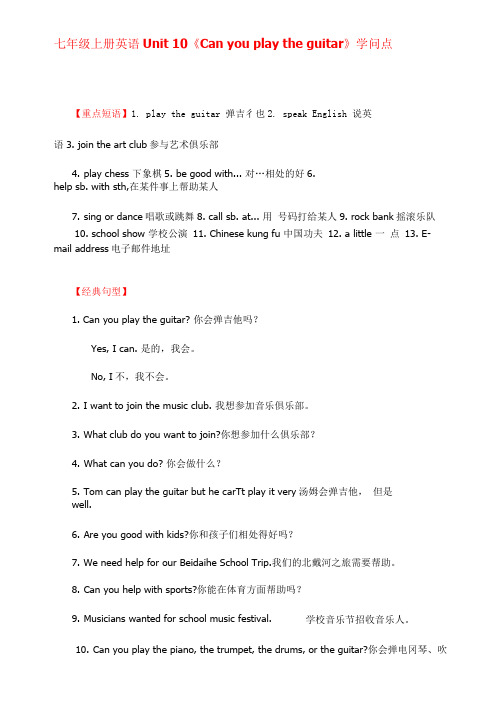
七年级上册英语Unit 10《Can you play the guitar》学问点【重点短语】1. play the guitar 弹吉彳也2. speak English 说英语3. join the art club参与艺术俱乐部4.play chess 下象棋5. be good with... 对…相处的好6.help sb. with sth,在某件事上帮助某人7.sing or dance唱歌或跳舞8. call sb. at... 用号码打给某人9. rock bank摇滚乐队10.school show 学校公演11. Chinese kung fu 中国功夫12. a little 一点13. E-mail address电子邮件地址【经典句型】1.Can you play the guitar? 你会弹吉他吗?Yes, I can. 是的,我会。
No, I不,我不会。
2.I want to join the music club. 我想参加音乐俱乐部。
3.What club do you want to join?你想参加什么俱乐部?4.What can you do? 你会做什么?5.Tom can play the guitar but he carTt play it very汤姆会弹吉他,但是well.6.Are you good with kids?你和孩子们相处得好吗?7.We need help for our Beidaihe School Trip.我们的北戴河之旅需要帮助。
8.Can you help with sports?你能在体育方面帮助吗?9.Musicians wanted for school music festival.学校音乐节招收音乐人。
10.Can you play the piano, the trumpet, the drums, or the guitar?你会弹电冈琴、吹喇叭、打鼓还是会弹吉他?11.Please call Zhang Heng at 622-6033. 请拨打622-6033 找张衡。
人教版九年级英语unit10知识总结
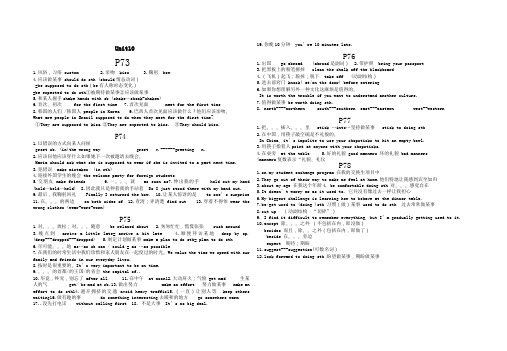
Unit10P731.风俗,习俗 custom2.亲吻 kiss3.鞠躬 bow4.应该做某事 should do sth (should 情态动词) =be supposed to do sth (be 有人称时态变化)=be expected to do sth①被期待做某事②应该做某事5.和某人握手shake hands with sb (shake —shook-shaken)6.首次、初次 for the first time7.首次见面 meet for the first time8.韩国的人们 /韩国人 people in Korea 9.巴西人首次见面应该做什么?他们应该亲吻。
What are people in Brazil supposed to do when they meet for the first time? ①They are supposed to kiss.②They are expected to kiss. ③They should kiss.P741.以错误的方式向某人问候greet sb. (in)the wrong way greet v.------greeting n. 2.应该问他应该穿什么如果她下一次被邀请去晚会。
Maria should ask what she is supposed to wear if she is invited to a part next time. 3.犯错误 make mistakes (in sth)4.迎接外国学生的晚会 the welcome party for foreign students5.交朋友 make friends6.一。
就 as soon as7.伸出我的手 hold out my hand(hold —held —held) 8.因此我只是伸着我的手站着 So I just stood there with my hand out.9.最后,我鞠躬回礼 Finally I returned the bow. 10.让某人惊讶的是 to one’s surprise11.在。
人教版英语九年级Unit10知识点

Unit10 You’re supposed to shake hands.本单元词组短语1. be supposed to do sth做⋯2. be expected to do sth./ 被希望做⋯3. shake hands (with和⋯)握(手4. bow to sb.向某人鞠躬5. for the first time首次,第一次6. people in Korea 国的人7. greet sb.( in) the wrong way 以的方式候某人8. be invited to sw. 被邀去⋯9. be invited to do sth.被邀做⋯party迎会11. as soon as 一⋯就⋯(引状从)12. as soon as sb can 尽可能快的。
out (my hands)伸出(我的手)14. on both sides of my face 在我的两个上15. be from= come from来自16. be relaxed about⋯放松/任意17. a bit/ little late晚一点18. value the time we spend with sb珍惜我与某人度的our everyday lives 在我的平常生活中20. drop by便拜,任意入21. make plans ( to do sth.)划做某事22. plan to do sth. 划做某事23. on the side of the face 在的一24. the town center在城中心25. as many as sb can = as many as possible 尽可能多的⋯26. be on time守27. the capital of clocks and watches 表之都28. after all竟,29. at noon在中午30. 15 minutes late到15分31. get / be mad (at sb)生气,气an effort (to do sth)努力做⋯ heavy traffic防备交通sb waiting 某人素来等候calling first没有早先打abroad 出国at home 在国内37. be important to⋯是重要的38. bring your passport照⋯off把⋯擦掉40 clean the chalk off the blackboard把黑板上的粉笔字擦掉northern coast of Norway挪威的北海岸42. during the winter season在冬季43. knock at/ on敲(,窗⋯)44. take off脱下,起45. be worth doing sth.得做⋯46. table manners餐桌礼47. mind your manners注意你的礼48. stick⋯into⋯ 把...插⋯an empty bowl敲空碗50. point at 指着 , point to 指向(重方向)51. at the table在餐桌旁52 at table在吃table manners基本的餐桌礼54. my biggest challenge 我最大的挑55. on my student exchange program在我的交生生is no reason to do sth. 没原因做57. go out of one’ s way (to特do地sth做.某)事⋯ ,格外努力做⋯sb feel at home使某人感觉至如59. a teenage granddaughter一个十几的(外)女60. talk to sb in French 用法和⋯交comfortable doing愉快/松做某事well/ badly/ politely止好63. behave oneself止矩64. as you can imagine 正如你想象的那65. be different from与⋯不相同/ get used to sth于某事be / get used to doing sth. 于做某事67. gradually get used to sth 逐某事68. cut it up把它切开69. eat it with a fork用叉子吃它your elbows on the table把肘部放在桌子上71. have a safe trip一路安全,旅途快乐72. show up出席,露面,到本单元知识点Section A1. In your country, what are you supposed to do when you meet someone for the first time【剖析】 be supposed to do sth被希望做某事,做 ......1)当主是人,表示告、建、任等,=should = “ tobe expected to do sth,You are supposed to___________( arrive) on time2)当主是物,表示“本;本”The train was supposed to arrive half an hour ago.【拓展】: be supposed to与should(1)be supposed 是 suppose 一的 ___________ 构。
人教版英语九年级知识点总结Unit10
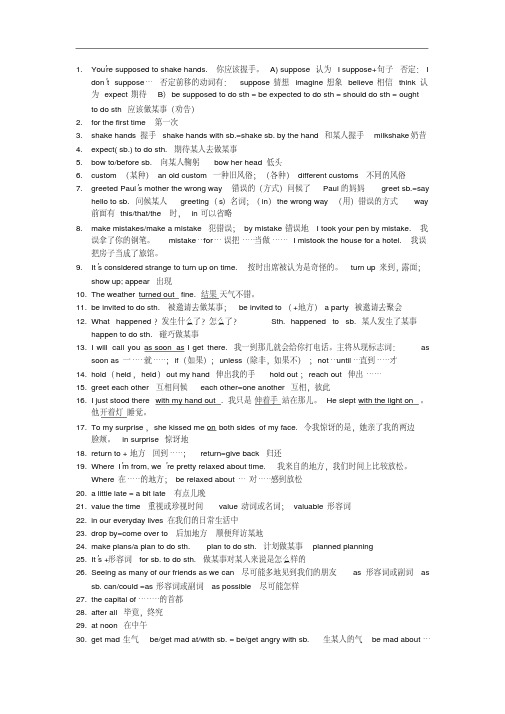
1.You’re supposed to shake hands. 你应该握手。
A) suppose 认为I suppose+句子否定:Idon’t suppose…否定前移的动词有:suppose猜想imagine想象believe相信think认为expect期待B)be supposed to do sth = be expected to do sth = should do sth = ought to do sth 应该做某事(劝告)2.for the first time 第一次3.shake hands 握手shake hands with sb.=shake sb. by the hand 和某人握手milkshake奶昔4.expect( sb.) to do sth. 期待某人去做某事5.bow to/before sb. 向某人鞠躬bow her head低头6.custom (某种)an old custom 一种旧风俗;(各种)different customs 不同的风俗7.greeted Paul’s mother the wrong way 错误的(方式)问候了Paul的妈妈greet sb.=sayhello to sb. 问候某人greeting(s)名词;(in)the wrong way (用)错误的方式way 前面有this/that/the时,in可以省略8.make mistakes/make a mistake 犯错误;by mistake错误地I took your pen by mistake. 我误拿了你的钢笔。
mistake…for…误把……当做……I mistook the house for a hotel. 我误把房子当成了旅馆。
9.It’s considered strange to turn up on time. 按时出席被认为是奇怪的。
四年级上册英语unit10单词

Unit 10 单词在四年级上册的英语学习中,Unit 10 是一个重要的单元,其中包含了许多重要的单词。
通过学习这些单词,学生们可以扩展他们的词汇量,并且能够更好地理解和运用英语。
下面是Unit 10 中的一些重要单词及其意义:1. umbrella意义:雨伞例句:I always carry an umbrella when it r本人ns.2. r本人ncoat意义:雨衣例句:She wore a r本人ncoat because it was r本人ning.3. cloudy意义:多云的例句:The sky is cloudy today.4. sunny意义:阳光明媚的例句:It's a sunny day, let's go out to play.5. windy意义:有风的例句:It's too windy to fly a kite today.6. snow意义:雪例句:We usually have snow in the winter.7. sled意义:雪橇例句:They went sledding on the hill.8. ski意义:滑雪例句:I learned how to ski last winter.9. skate意义:滑冰例句:She goes skating every winter.10. jacket意义:夹克例句:He put on a jacket because it was cold outside.11. glove意义:手套例句:She wore gloves to keep her hands warm.12. scarf意义:围巾例句:He wrapped a scarf around his neck to keep warm.通过学习这些单词,学生们可以更好地理解和运用有关天气和季节的英语词汇。
希望同学们能够通过课堂学习和词汇积累,更好地掌握英语,为将来的学习打下良好的基础。
大学英语精读第一册unit10参考答案
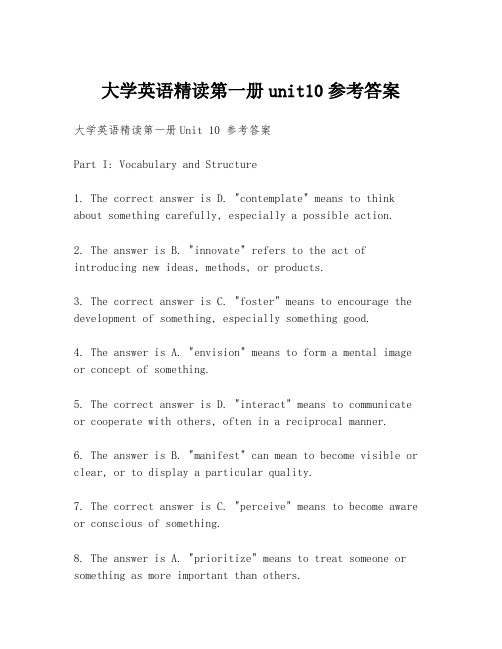
大学英语精读第一册unit10参考答案大学英语精读第一册Unit 10 参考答案Part I: Vocabulary and Structure1. The correct answer is D. "contemplate" means to think about something carefully, especially a possible action.2. The answer is B. "innovate" refers to the act of introducing new ideas, methods, or products.3. The correct answer is C. "foster" means to encourage the development of something, especially something good.4. The answer is A. "envision" means to form a mental image or concept of something.5. The correct answer is D. "interact" means to communicate or cooperate with others, often in a reciprocal manner.6. The answer is B. "manifest" can mean to become visible or clear, or to display a particular quality.7. The correct answer is C. "perceive" means to become aware or conscious of something.8. The answer is A. "prioritize" means to treat someone or something as more important than others.9. The correct answer is D. "substantiate" means to provide proof or evidence for a claim.10. The answer is B. "utilize" means to use something for a practical purpose.Part II: Reading Comprehension1. Question 1: The answer is B. The passage mentions that the author's first encounter with the book was in high school, indicating that it was not a new discovery.2. Question 2: The correct answer is C. The author describes the book as a source of inspiration and a guide, which suggests a profound impact.3. Question 3: The answer is A. The author discusses the book's influence on their personal growth and development.4. Question 4: The correct answer is D. The passage indicates that the author revisited the book in college and found new insights, showing a continued relevance.5. Question 5: The answer is B. The author reflects on the book's ability to offer different perspectives at different times, suggesting a timeless quality.Part III: Cloze Test1. The correct word to fill in the first blank is inspired,as the context suggests that the author was motivated by the book.2. The second blank should be filled with contemplated, indicating that the author thought deeply about the book's content.3. For the third blank, the word manifested is appropriate, as it shows that the book's influence became clear.4. The fourth blank requires prioritized, indicating that the author considered the book's lessons important.5. The fifth blank should be filled with interacted, as it implies that the author engaged with the book's ideas.6. The sixth blank is best filled with utilized, suggesting that the author applied the book's teachings.7. For the seventh blank, substantiated is the correct word, as it implies that the author found evidence for the book's claims.8. The eighth blank should be filled with perceived, indicating that the author recognized the book's value.9. The ninth blank requires fostered, as it suggests that the author nurtured the qualities mentioned in the book.10. The final blank is best filled with innovated, indicating that the author introduced new ideas inspired by the book.Part IV: Translation1. The correct translation for the first sentence is: "The book has had a profound impact on my life and has guided me through many challenging times."2. The second sentence should be translated as: "Whenever I reread it, I find new insights and perspectives that I hadn't noticed before."3. The translation for the third sentence is: "It has taught me the importance of self-reflection and the value of continuous learning."4. The fourth sentence should be translated as: "The lessons from the book have become a part of my personal philosophy and have shaped my approach to life."5. The final sentence translates to: "I believe that the wisdom contained in this book is timeless and will continue to inspire generations to come."Part V: WritingFor the writing section, the answer would typically involve a personal essay or response to a prompt related to the unit's theme. Since the prompt is not provided, a sample answer cannot be given. However, students should ensure theirwriting is coherent, well-structured, and addresses the topic with relevant examples and analysis.Please note that the actual content of the unit, including vocabulary, reading passages, and exercises, would be necessary to provide accurate answers. The above answers are hypothetical and meant to serve as an example of what the reference answers might look like.。
人教版英语八年级上册第十单元unit10词组
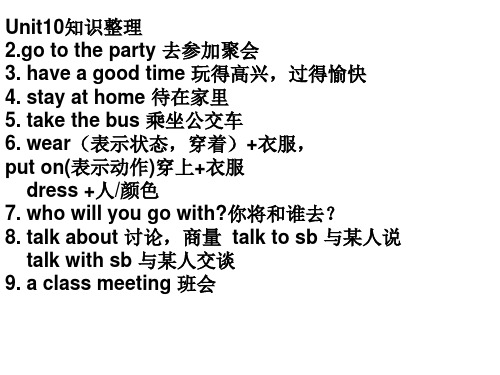
47. experience 经历,经验(不可数) 48. get into 陷入
If I am a teacher, I will be very happy. I like students and the job. In class, I’ll discuss questions with them. I’ll be glad to help them. I believe each of them will be successful. After class, we will play sports together. We’ll have a picnic on weekends. I think we’ll have a good time.
talk with sb 与某人交谈 9. a class meeting 班会
பைடு நூலகம்
10. plan to do sth 计划,打算做某事 11. half the class 班里一半的学生(是复数) 12. watch a video 看录像 13. leave for+地点 动身去某地
leave A for B 离开A去B地 14. ask sb to do sth 要求某人做某事
If I am a teacher, I won’t be angry with the students. I won’t punish(惩罚) the students in a rude(粗鲁) way. If I am a teacher, I’ll smile(微笑) at everyone.
28. go to college 去上大学 29. get an education 接受教育 30. keep….to oneself 保守秘密 31. these day 当今,如今 32. worry 名词或动词“担心” 过去式或形容词为“worried”
- 1、下载文档前请自行甄别文档内容的完整性,平台不提供额外的编辑、内容补充、找答案等附加服务。
- 2、"仅部分预览"的文档,不可在线预览部分如存在完整性等问题,可反馈申请退款(可完整预览的文档不适用该条件!)。
- 3、如文档侵犯您的权益,请联系客服反馈,我们会尽快为您处理(人工客服工作时间:9:00-18:30)。
Unit10Short conversations1. W: I’ve heard you are going to teach students about World War II in class next week.M: That’s right—I am. Above everything, I’m going to tell them never to forget the tragic effects of war. War is such a terrible and sad thing.Q: What is the man going to tell his students to remember most of all ?2. M: World War II brought so much good to the world — freedom, technology ,and more.W: But at what cost? The two atomic bombs alone killed more than 200,000 people.Altogether, the war killed about 35 million people who weren’t soldiers.Q: Who were the 35 million people killed?3. M: The heroes of World War II fought through the greatest nightmare the world has ever seen. W: That’s true. And even though those great heroes are growing old, we shouldn’t forget them. Q: What shoul dn’t we forget ?4. W: Did you see the war film on television last night ? It was so exciting I couldn’t sleepafterwards.M: I saw it. It was on World War II, and it reminded me of how important the war was in bringing peace to the world.Q: What was the man reminded of ?5. W: I’ve learned about World War II in my classes. How could Germany and Japan have been soterrible ?M: Many people thinks the peoples of those countries were deceived by their lea ders. I don’t think it will happen against though.Q: According to the man, why did Germany and Japan do terrible things?6. M: Could you clarify your statement? What did you mean when you said history could repeatitself?W: I meant that if we did not learn from the lesson of World War II ,we might repeat the mistakes that led to it.Q: What does the woman think of World War II?7. W: By the time they returned from war, millions of boys had been transformed into men.M: I guess seeing death and destruction had a terrible impact on them grow up. Hopefully, they learned how to avoid war.Q: What caused millions of boys to grow up?8. M: Part of the public has a positive perception of war.W: That’s because they have never seen war for themselves. Having lived through World War II,I know that war is a terrible thing.Q: How does the woman know about war?9. W: Why did World War II have such far-reaching effects?M: Well, many people think it was the first truly global war because nearly all the major powers of the world were involved. Fifty-six countries had soldiers fighting and about 35 million people were killed.Q: How many nations took part in World War II?10. M: Have you been paying attention? Can you tell me what I just said about World War II?W: Y es, sir. I have been listening carefully. Y ou said,“Soldiers protested other wars after returning from World War II.”Q: Where is the conversation taking place?1.D2.B3.B4.D5.C6.C7.A8.B9.C 10.ALong conversationM: Good evening!For today’s program, we have invited a lady who worked as a nurse during World War II.W: Good evening!At the outbreak of World War II, the government called on all its citizens 18 years old and over to help out ,I started training as a nurse in November,1940.It was two months of being taught basic skills in the School of Nursing.M: What happened to you during the blitz? Y ou know, when Nazi Germany bombed Britain?W: Manchester was bombed on the 22nd and 23rd of December, 1940.On December 24 I receiveda telegram requesting my immediate return from leave for nursing duties. Many volunteers inthe Manchester Social Services had taken a week’s lea ve for the Christmas holidays, so the Manchester City Rest Centers were short of staff. Christmas Day was therefore my first day of nursing. We worked almost without sleep for days until the crisis eased.1.What sort of work did the woman do during World War II? D2.What did the government ask all adults to do? C3.How did she prepare for her job? A4.Why were the Manchester City Rest Centers were short of staff? B5.When were they finally able to relax? DPassageI was born in Liverpool in February,1938,so I was only 18 months old when World War II broke out. During the bombings, my family lived in an air raid shelter in the back garden of our house. My father did his normal work during the day and Home Guard duties at night. After the terrific pounding that Liverpool endured in may,1941,from German bombers, my family had to move away to the countryside. I started school in1943 but I had to carry a gas mask with me everywhere I went. Liverpool suffered heavily in the bombing and it became quite common to see the horrible bombing and it became quite common to see the horrible bomb sites. But everyone remained tough in the face of so much danger, and Britain won in the end.1. How old was the speaker when World War II started? B2. Where did they live during the bombing of their city? C3. Why did his family move away? D4. What did he carry to school with him? D5. What was common for him to see during that difficult time? AWork with your partner and talk about the things you are frightened of, such as animals, heights, flying, etc., referring to the useful expressions in the boxes if necessary.Are you frightened of anything in particular?Are you especially afraid of anything?Do you fear anything?Does anything frighten you particularly?What scares you?Useful expressions...I’m afraid of walking alone in an open field at night.I'm scared of walking by myself in the open at the night.Walking alone in a field at night scares me.I'm frightened to be done in a field in the dark....a shadow ahead scares me stiff.A shadow scares/frightens me out of my wits/senses.A shadow sends shivers down my spine.A shadow makes my hair stand on end.A shadow gives me gooseHest1.My blood runs cold at the sight of a shadow....I wouldn't dare make a single sound.I don't dare to utter a sound.I wouldn't dare let out a soundI guess so.I think so.I agree.That's true....help you shake off your fear of the dark....help you get rid of/overcome that fear of the dark.Questions for Discussion.1. How can one overcome fear of giving a speech in public?2. Are you afraid of going to the dentist? Eyes, how can you get rid of your fear?3. Do you fear certain insects or animals? Why?4. Are you afraid of horror movies? If yes, describe your fear.5. What was the most frightening experience you've had?6. Do you ever have nightmares? What are they about?7. Are you afraid of walking alone at night? If yes, what are you afraid of?8. Is there any person you are afraid of? Why?9. Are you afraid of flying?10. Are there certain weather conditions that scare people? What are they, and why?。
